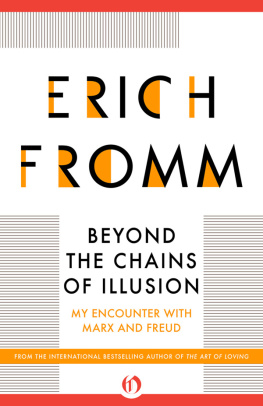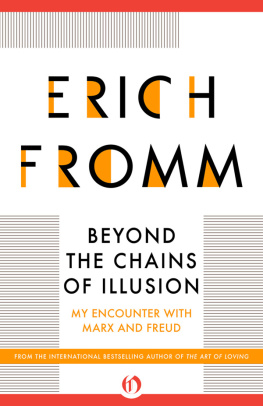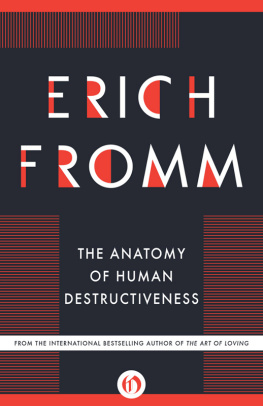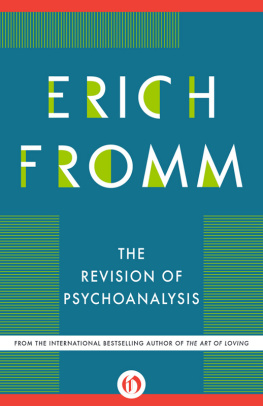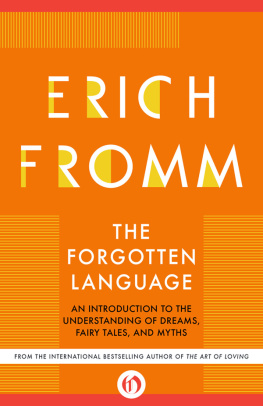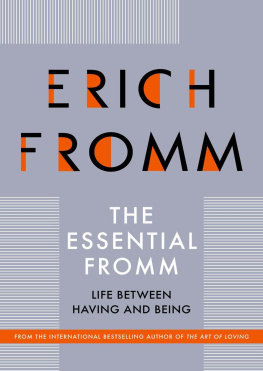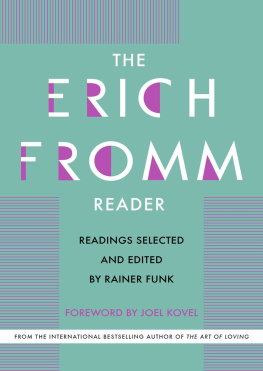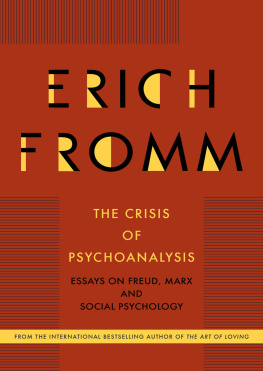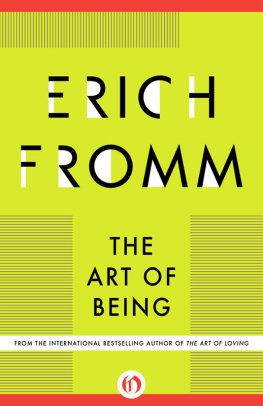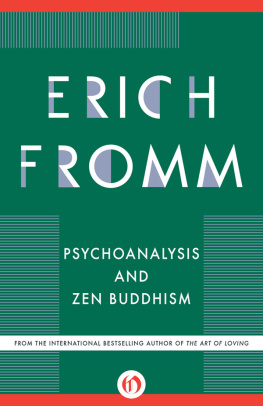
Beyond the Chains of Illusion
My Encounter with Marx and Freud
Erich Fromm

The demand to give up the illusions about its condition is the demand to give up a condition which needs illusions.
Criticism has plucked the imaginary flowers from the chain not so that man will wear the chain without any fantasy or consolation but so that he will shake off the chain and cull the living flower.
Karl Marx
Men can not remain children forever; they must in the end go out into hostile life. We may call this education to reality.
No, our science is no illusion. But an illusion it would be to suppose that what science can not give us we can get elsewhere.
Where there is Id, there shall be Ego.
Sigmund Freud
I. Some Personal Antecedents
If a man asks himself how he ever became interested in those fields of thought which were destined to occupy the most important place throughout his life, he will not find it easy to give a simple answer. Perhaps he was born with an inclination for certain questions, or perhaps it was the influence of certain teachers, or of current ideas, or of personal experiences which led him along the path of his later interestswho knows which of these factors have determined the course of his life? Indeed, if one wanted to know precisely the relative weight of all these factors, nothing short of a detailed historical autobiography could even attempt to give the answers.
Since the purpose of this book is by no means that of a historical, but rather that of an intellectual autobiography, I shall try to pick out a few experiences during my adolescence which led to my later interest in the theories of Freud and of Marx, and the relation between the two.
If I want to understand how the problem of why people act the way they do became of such paramount interest to me, it might be sufficient to assume that having been an only child, with an anxious and moody father and a depression-prone mother was enough to arouse my interest in the strange and mysterious reasons for human reactions. Yet, I vividly remember one incidentI must have been around twelve years oldwhich stimulated my thoughts far beyond those I had had before and which prepared an interest in Freud which was to become manifest only ten years later.
This was the incident: I had known a young woman, a friend of the family. Maybe she was twenty-five years of age; she was beautiful, attractive and in addition a painter, the first painter I ever knew. I remember having heard that she had been engaged but after some time had broken the engagement; I remember that she was almost invariably in the company of her widowed father. As I remember him, he was an old, uninteresting, and rather unattractive-looking man, or so I thought (maybe my judgment was somewhat biased by jealousy). Then one day I heard the shocking news: her father had died, and immediately afterwards she had killed herself and left a will which stipulated that she wanted to be buried together with her father.
I had never heard of an Oedipus complex or of incestuous fixations between daughter and father. But I was deeply touched. I had been quite attracted to the young woman; I had loathed the unattractive father; never before had I known anyone to commit suicide. I was hit by the thought How is it possible? How is it possible that a beautiful young woman should be so in love with her father that she prefers to be buried with him to being alive to the pleasures of life and of painting?
Certainly I knew no answer, but the how is it possible stuck. And when I became acquainted with Freuds theories, they seemed to be the answer to a puzzling and frightening experience at a time when I was beginning to develop into an adolescent.
My interest in Marxs ideas has quite a different background. I was brought up in a religious Jewish family, and the writings of the Old Testament touched me and exhilarated me more than anything else I was exposed to. Not all of them to the same degree; I was bored by or even disliked the history of the conquest of Canaan by the Hebrews; I had no use for the stories of Mordecai or Esther; nor did Iat that timeappreciate the Song of Songs. But the story of Adam and Eves disobedience, of Abrahams pleading with God for the salvation of the inhabitants of Sodom and Gomorrah, of Jonahs mission to Nineveh, and many other parts of the Bible impressed me deeply. But more than anything else, I was moved by the prophetic writings, by Isaiah, Amos, Hosea; not so much by their warnings and their announcement of disaster, but lay their promise of the end of days, when nations shall beat their swords into plowshares and their spears into pruning hooks: nation shall not lift sword against nation, neither shall they learn war any more; when all nations will be friends, and when the earth shall be full of the knowledge of the Lord, as the waters cover the sea. The vision of universal peace and harmony between all nations touched me deeply when I was twelve and thirteen years old. Probably the immediate reason for this absorption by the idea of peace and internationalism is to be found in the situation in which I found myself: a Jewish boy in a Christian environment, experiencing small episodes of anti-Semitism but, more importantly, a feeling of strangeness and of clannishness on both sides. I disliked clannishness, maybe all the more so because I had an overwhelming wish to transcend the emotional isolation of a lonely, pampered boy; what could be more exciting and beautiful to me than the prophetic vision of universal brotherhood and peace?
Perhaps all these personal experiences would not have affected me so deeply and lastingly had it not been for the event that determined more than anything else my development: the First World War. When the war started during the summer of 1914, I was a fourteen-year-old boy for whom the excitement of war, the celebration of victories, the tragedy of the death of individual soldiers I knew, were uppermost in my experience. I was not concerned with the problem of war as such; I was not struck by its senseless inhumanity. But soon all this changed. Some experiences with my teachers helped. My Latin teacher, who in his lessons during the two years before the war had proclaimed as his favorite maxim the sentence, Si vis pacem para bellum (if you want peace prepare for war), showed his delight when the war broke out. I recognized that his alleged concern for peace could not have been true. How was it possible that a man who always seemed to have been so concerned with the preservation of peace should now be so jubilant about the war? From then on, I found it difficult to believe in the principle that armament preserves peace, even when advocated by people possessing more goodwill and honesty than my Latin teacher had.
I was equally struck by the hysteria of hate against the British, which swept throughout Germany in those years. Suddenly they had become cheap mercenaries, evil and unscrupulous, trying to destroy our innocent and all-too-trusting German heroes. In the midst of this national hysteria, one decisive event stands out in my mind. In our English class we had been given the assignment of learning by heart the British national anthem. This assignment was given us before the summer vacation, while there was still peace. When classes were resumed we boys, partly out of mischief and partly because we were infected by the hate England mood, told the teacher that we refused to learn the national anthem of what was now our worst enemy. I still see him standing in front of the class, answering our protests with an ironical smile, and saying calmly: Dont kid yourselves; so far England has never lost a war! Here was the voice of sanity and realism in the midst of insane hatredand it was the voice of a respected and admired teacher! This one sentence and the calm, rational way in which it was said, was an enlightenment. It broke through the crazy pattern of hate and national self-glorification and made me wonder and think, How is it possible?
Next page
